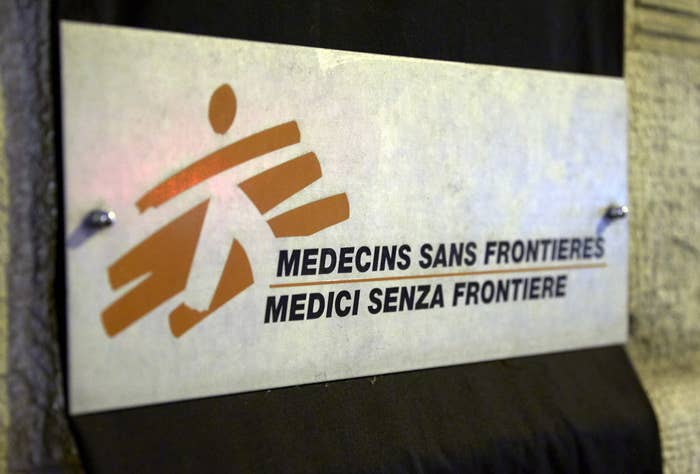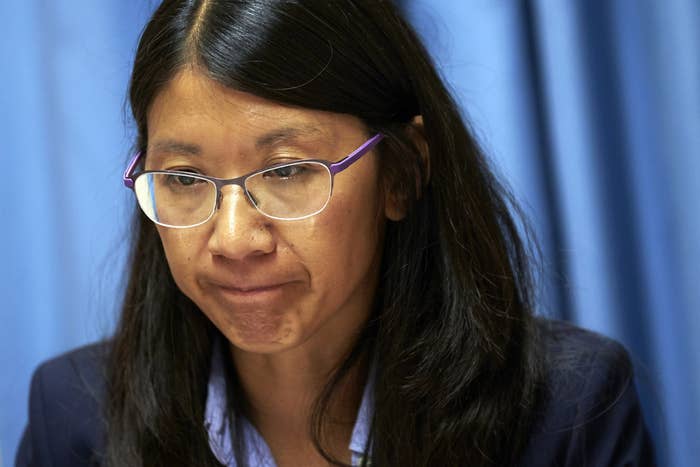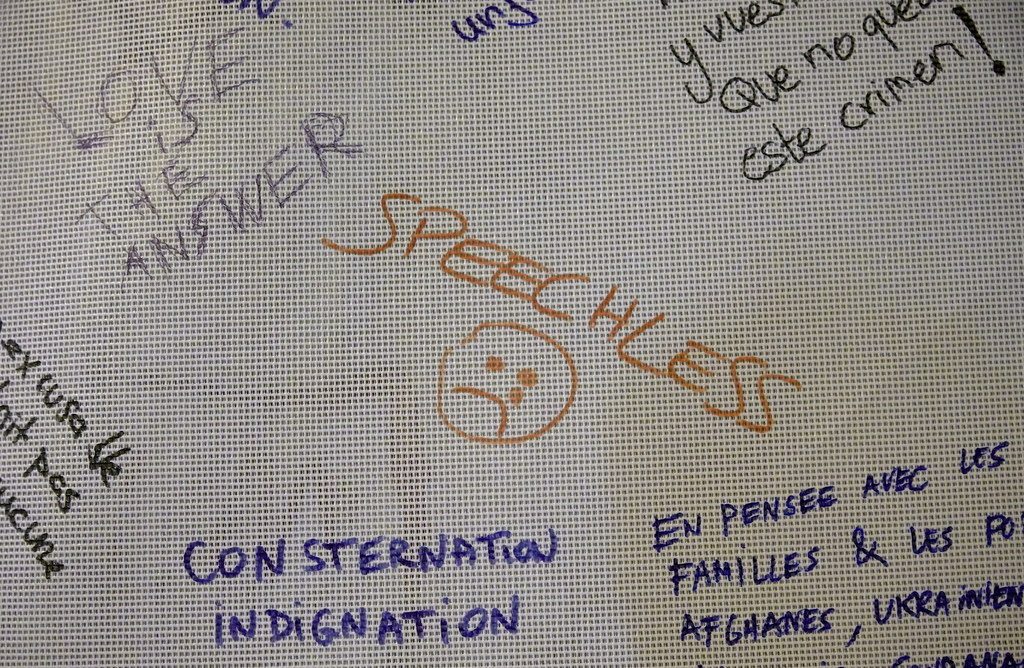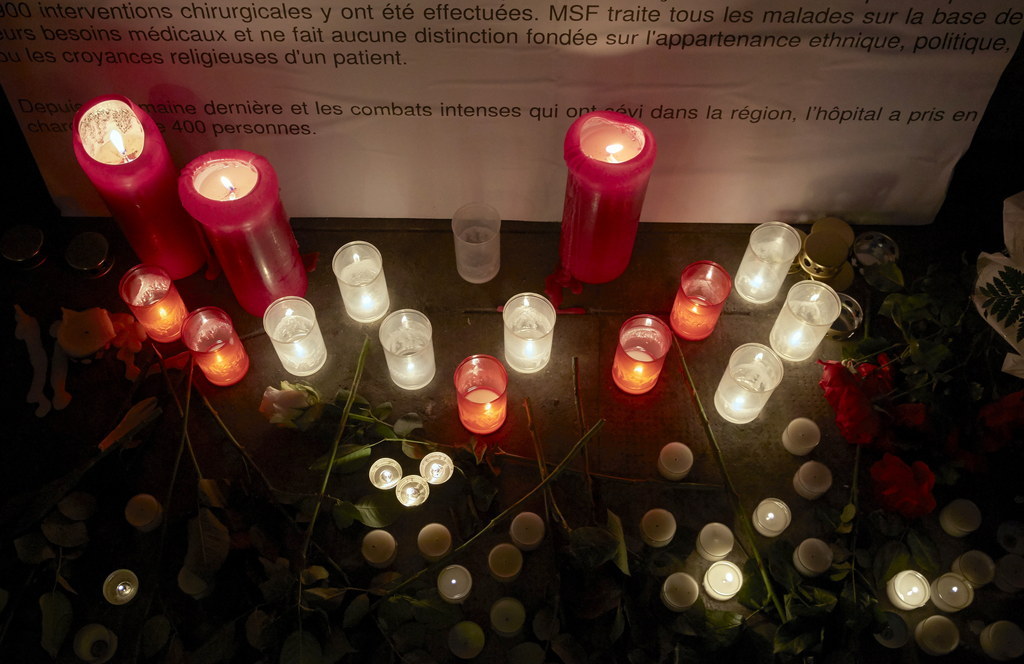
President Barack Obama called the head of aid agency Doctors Without Borders on Wednesday, the White House announced, to apologize and express his condolences for the U.S. bombing of its hospital in Kunduz, Afghanistan, which killed 22 people Saturday morning.
White House spokesman Josh Earnest told reporters at a press briefing the president telephoned Dr. Joanne Liu from the Oval Office on Wednesday morning to "apologize and express his condolences for the [Medécins Sans Frontières] staff and patients who were killed and injured when a U.S. military airstrike mistakenly struck an MSF field hospital."
"The president assured Dr. Liu that the Department of Defense investigation currently underway would provide a transparent, thorough, and objective accounting of the facts and circumstances of the incident," Earnest said, "and that if necessary the president would implement changes that would make tragedies like this one less likely to occur in the future."
The phone call came after Liu spoke earlier on Wednesday at the Palais des Nations in Geneva, Switzerland, to demand an independent investigation by a never-before-used international body.
Liu, MSF international president, said the bombing "cannot be tolerated" and that "inconsistencies" in U.S. and Afghan accounts meant that any investigation must be conducted independently.
Twelve of the organization's staff members and 10 patients — including three children — were killed in the bombing, the organization said. Another 37 people, including 19 staff, were wounded.
Over the weekend, the U.S. said the hospital bombing may have been "collateral damage" in its operations against the Taliban in the city, while the Afghan Interior Ministry insisted the hospital was harboring militants — a claim the aid organization said it was "disgusted" by.
Liu said the organization would be asking signatory states of the Geneva Convention to invoke the never-before-used International Humanitarian Fact-Finding Commission to conduct a probe in order to "establish the truth and to reassert the protected status of hospitals in conflict."
After the White House statement on Obama's phone call, MSF acknowledged the president's apology, but reiterated its calls for an independent investigation into the incident.
"We reiterate our ask that the U.S. government consent to an independent investigation led by the International Humanitarian Fact-Finding Commission to establish what happened in Kunduz, how it happened, and why it happened," Liu said in a statement.

The commission was established in 1991 under the Additional Protocols of the Geneva Conventions and requires one of 76 signatory states to sponsor an inquiry in order to activate it.
"Governments up to now have been too polite or afraid to set a precedent. The tool exists and it is time it is activated," Dr. Liu said.
"This was not just an attack on our hospital — it was an attack on the Geneva Conventions," she said. "This cannot be tolerated. These Conventions govern the rules of war and were established to protect civilians in conflicts - including patients, medical workers and facilities. They bring some humanity into what is otherwise an inhumane situation."

"The Geneva Conventions are not just an abstract legal framework," Dr. Liu added. "They are the difference between life and death for medical teams on the frontline. They are what allow patients to access our health facilities safely and what allows us to provide healthcare without being targeted."
On Tuesday, one of the United States' top generals in Afghanistan, Gen. John Campbell, testified before Congress and addressed the airstrike and the U.S. investigation into the incident.
Campbell opened his testimony by discussing the "tragic loss of life" in Kunduz and admitted that the hospital "had been mistakenly struck." He vowed that the Pentagon investigation into the incident would be "thorough, objective, and transparent."
The U.S. military had been supporting its Afghan counterpart with airstrikes in Kunduz after the Taliban launched a surprise multi-pronged attack to seize the city early last week.

Here are Dr. Liu's full remarks as published on the Doctors Without Borders website:
On Saturday morning, MSF patients and staff killed in Kunduz joined the countless number of people who have been killed around the world in conflict zones and referred to as 'collateral damage' or as an 'inevitable consequence of war'. International humanitarian law is not about 'mistakes'. It is about intention, facts and why.
The U.S. attack on the MSF hospital in Kunduz was the biggest loss of life for our organization in an airstrike. Tens of thousands of people in Kunduz can no longer receive medical care now when they need it most. Today we say: enough. Even war has rules.
In Kunduz our patients burned in their beds. MSF doctors, nurses and other staff were killed as they worked. Our colleagues had to operate on each other. One of our doctors died on an improvised operating table - an office desk - while his colleagues tried to save his life.
Today we pay tribute to those who died in this abhorrent attack. And we pay tribute to those MSF staff who, while watching their colleagues die and with their hospital still on fire, carried on treating the wounded.
This was not just an attack on our hospital - it was an attack on the Geneva Conventions. This cannot be tolerated. These Conventions govern the rules of war and were established to protect civilians in conflicts - including patients, medical workers and facilities. They bring some humanity into what is otherwise an inhumane situation.
The Geneva Conventions are not just an abstract legal framework - they are the difference between life and death for medical teams on the frontline. They are what allow patients to access our health facilities safely and what allows us to provide healthcare without being targeted.
It is precisely because attacking hospitals in war zones is prohibited that we expected to be protected. And yet, ten patients including 3 children, and 12 MSF staff were killed in the aerial raids.
The facts and circumstances of this attack must be investigated independently and impartially, particularly given the inconsistencies in the U.S. and Afghan accounts of what happened over recent days. We cannot rely on only internal military investigations by the U.S., NATO and Afghan forces.
Today we announce that we are seeking an investigation into the Kunduz attack by the International Humanitarian Fact-Finding Commission. This Commission was established in the Additional Protocols of the Geneva Conventions and is the only permanent body set up specifically to investigate violations of international humanitarian law. We ask signatory States to activate the Commission to establish the truth and to reassert the protected status of hospitals in conflict.
Though this body has existed since 1991, the Commission has not yet been used. It requires one of the 76 signatory States to sponsor an inquiry. Governments up to now have been too polite or afraid to set a precedent. The tool exists and it is time it is activated.
It is unacceptable that States hide behind 'gentlemen's agreements' and in doing so create a free for all and an environment of impunity. It is unacceptable that the bombing of a hospital and the killing of staff and patients can be dismissed as collateral damage or brushed aside as a mistake.
Today we are fighting back for the respect of the Geneva Conventions. As doctors, we are fighting back for the sake of our patients. We need you, as members of the public, to stand with us to insist that even wars have rules.

